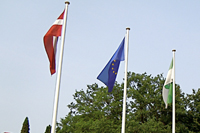 At every stop, I realized the diversity of the population. "My grandfather is Polish," my mother was born in the Soviet Union", I have Latvian citizenship and my parents have the Russian one "... so many situations that make encounters rich of discussions and comparisons.
At every stop, I realized the diversity of the population. "My grandfather is Polish," my mother was born in the Soviet Union", I have Latvian citizenship and my parents have the Russian one "... so many situations that make encounters rich of discussions and comparisons.Today, the Latvians try increasingly to assert their identity and their culture, including differentiation from Russians to foreigners. Latvia is not Russia. Certainly, they have influences, but the language, traditions and culture are different. Mesures are being taken by the government to preserve the language for example, or minorities such as the Livs.
During the Soviet occupation, the Latvian folklore was put into brackets. The objective of Moscow: unify the culture of Soviet nations. To escape these constraints, the Latvians have emigrated to the English-speaking countries creating a new diaspora. Since 2004, migration flows are increasing especially among young people seeking better living conditions and higher wages. In summer, they return home.
Not forgetting where they came from and proud of their identity, the immigrants know that it is a way to promote their country abroad, to stimulate the curiosity of other Europeans. The Latvian community abroad represents about 250,000 people. At least half the young people I met, spent several months abroad to work or improve their English. Others were more critical: they were leaving because they don't like the organization of the country. This last observation reminds me of a question: if the Latvians emigrated, how are they going to build their country?








